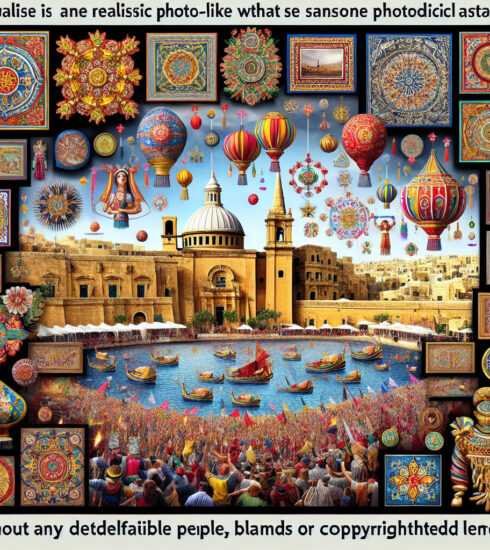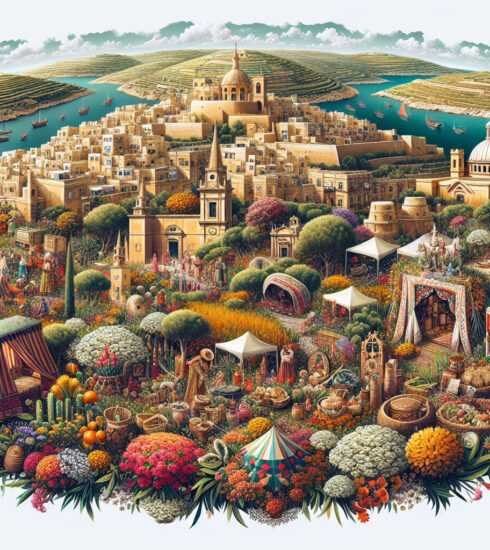Unveiling Maltas Cultural Tapestry: Exploring Traditional Celebrations | Article
Introduction
Malta, an archipelago in the Mediterranean Sea, is not just known for its stunning natural beauty and rich history; it is also renowned for its vibrant cultural fabric. The Maltese people have a deep-rooted appreciation for tradition and celebration, which is evident in the plethora of festivals and events that take place throughout the year. From religious processions to music festivals, Malta offers a diverse range of cultural experiences that are sure to captivate visitors. In this article, we will explore the various threads of tradition and celebration that make up Malta’s cultural fabric, focusing on the festivals that showcase the island’s unique heritage.
The Festivals of Malta
Malta boasts a wide array of festivals that celebrate various aspects of its cultural heritage. These festivals provide a glimpse into the island’s history, traditions, and religious beliefs, making them an ideal way to experience the local culture. Let’s take a closer look at some of the most prominent festivals in Malta:
Feast of St. Paul’s Shipwreck
Every year on the 10th of February, the Maltese people come together to celebrate the Feast of St. Paul’s Shipwreck. This religious festival commemorates the shipwreck of the Apostle Paul on the island of Malta in 60 AD. The festivities include processions, church services, and street decorations. The highlight of the festival is the carrying of the statue of St. Paul through the streets of Valletta, the capital city.
Carnival in Malta
Carnival is a much-loved festival in Malta, celebrated with great enthusiasm and joy. The festivities typically take place in February, just before the start of Lent. Carnival in Malta is known for its colorful parades, intricate floats, and extravagant costumes. The main events are held in Valletta, Floriana, and Nadur, with street parties and music performances taking place throughout the islands.
Easter in Malta
Easter is an important religious holiday in Malta, and the celebrations are steeped in tradition. The week leading up to Easter Sunday, known as Holy Week, is filled with religious processions and ceremonies. The most famous procession takes place in the city of Zebbug, where a life-size statue of the Risen Christ is carried through the streets amidst the sound of marching bands and fireworks.

Għanafest
Għanafest is a unique music festival that celebrates traditional Maltese music. Held annually in June, the festival showcases the art of għana, a form of traditional Maltese folk singing. Local musicians perform on stage, singing heartfelt songs that highlight the Maltese language and culture. Għanafest also features traditional food stalls and craft exhibitions, providing visitors with an immersive experience of Maltese traditions.
Isle of MTV Malta
Isle of MTV Malta is one of the biggest music festivals in the Mediterranean, attracting renowned international artists and thousands of music enthusiasts. Organized by MTV Europe, the festival takes place in Floriana’s Il-Fosos Square and offers a combination of live music performances, DJ sets, and spectacular light shows. Isle of MTV Malta has become a major highlight on the European music festival calendar, drawing visitors from all over the world.
Malta’s Cultural Traditions
In addition to the festivals, Malta is also known for its rich cultural traditions. These traditions have been passed down through generations, shaping the identity of the Maltese people. Let’s explore some of the key cultural traditions that form part of Malta’s cultural fabric:
Filklor Malti
Filklor Malti, or Maltese folklore, is an integral part of the Maltese cultural heritage. It encompasses various aspects, including traditional music, dance, and storytelling. Through Filklor Malti, the Maltese people have preserved their unique customs and legends. Traditional Maltese songs, known as “ghannejja,” and the lively folk dance called “il-Maltija” are cherished cultural expressions that continue to be celebrated today.
Mediterranean Cuisine
Malta’s culinary traditions are deeply rooted in the Mediterranean region. The island’s cuisine reflects a mix of influences from neighboring countries, resulting in a diverse and flavorful culinary landscape. Traditional Maltese dishes, such as rabbit stew (fenek), pastizzi (flaky pastries filled with ricotta or peas), and imqaret (date-filled pastries), are staples of Maltese gastronomy. Food plays a central role in Maltese culture, with feasts and gatherings bringing people together to enjoy delicious meals and celebrate special occasions.

Maltese Lace
Maltese lace is an intricate and delicate craft that has been practiced on the island for centuries. The art of lace making has been passed down through generations, with skilled artisans creating beautiful lacework using fine threads. Maltese lace is characterized by its intricate designs and attention to detail, with various patterns and motifs inspired by nature. This traditional craft is highly valued and has become an important part of Malta’s cultural heritage.
Maltese Language
The Maltese language is a unique amalgamation of Semitic and Romance influences. It is the only Semitic language written in Latin script. Maltese, along with English, is an official language of Malta. The Maltese people take great pride in their language, which is a reflection of their cultural identity. Learning a few basic Maltese phrases can go a long way in connecting with the locals and immersing yourself in the Maltese culture.
Conclusion
Malta’s cultural fabric is woven with threads of tradition and celebration. The festivals and cultural traditions of the island provide a window into its rich history and vibrant culture. Whether it’s witnessing the grand processions of St. Paul’s Shipwreck, enjoying the colorful parades of Carnival, or immersing yourself in the traditional music of Għanafest, each festival offers a unique experience that showcases Malta’s cultural heritage. The cultural traditions, such as Filklor Malti, Mediterranean cuisine, Maltese lace, and the Maltese language, further contribute to the rich tapestry that is Malta’s cultural fabric. By participating in these celebrations and exploring these traditions, visitors can truly appreciate the beauty and depth of Malta’s cultural heritage.
Related Articles
For more information on Malta’s festivals, check out these articles:






